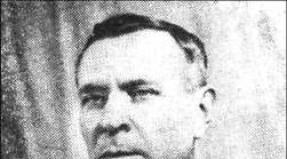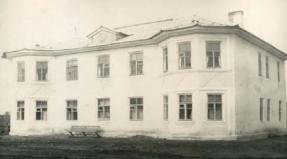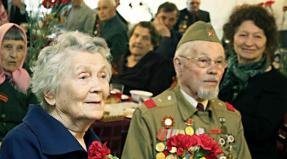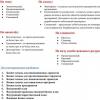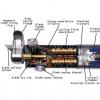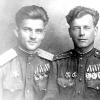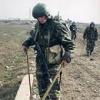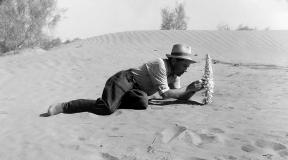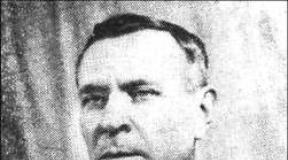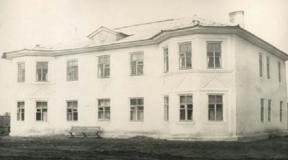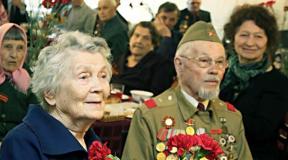Generals. Life for the Motherland, honor for no one General Loginov Mikhail Alexandrovich
Loginov Anatoly Fedorovich – tank driver of the 15th Guards Separate Breakthrough Tank Regiment (8th Guards Tank Corps, 40th Army, Voronezh Front), guard technical lieutenant.
Born on April 29, 1923 in the village of Selikhovo, Prechisto-Kamensky volost, Novotorzhsky district, Tver province (now Torzhoksky district, Tver region). Russian. In 1941 he graduated from the 10th grade of school in the village of Krasnoye (now Torzhok district).
In the army since July 1941. In July-August 1941 - cadet of the 15th tank training regiment (city of Naro-Fominsk, Moscow region). In August-October 1941 he studied at the Chelyabinsk Military Aviation School of Aircraft Mechanics. In 1941-1942 - cadet of the 30th training tank regiment (city of Kopeisk, Chelyabinsk region).
In April 1943 he graduated from the Chelyabinsk Tank School. In April-July 1943 - senior mechanic-driver of the 6th reserve tank regiment (city of Gorky, now Nizhny Novgorod). In July-August 1943 - senior mechanic-driver of the 59th Guards separate breakthrough tank regiment, which was formed in the Tambov tank camp.
Participant of the Great Patriotic War: in August 1943 - February 1944 - senior mechanic-driver of a tank of the 15th Guards separate breakthrough tank regiment. He fought on the Voronezh (August-October 1943) and 1st Ukrainian (October 1943 - February 1944) fronts. Participated in the Belgorod-Kharkov and Sumy-Priluki operations, the battle for the Dnieper, the Kyiv offensive and defensive operations.
He particularly distinguished himself during the Sumsko-Priluki operation and during the crossing of the Dnieper. On September 10, 1943, his tank was the first to break into the crossing of the Khorol River in the village of Lipovaya Dolina (Sumy region, Ukraine) and held it for about 2 hours, destroying 2 enemy tanks. On September 13, 1943, in the area of the villages of Krasnoznamenka, Petrovka-Romenskaya and Veneslavovka (Gadyachsky district, Poltava region, Ukraine) he destroyed 3 enemy tanks and a lot of enemy manpower. On September 22, 1943, he was among the first in the regiment to cross the river, his tank was the first to break into the village of Velikiy Bukrin (Mironovsky district, Kyiv region, Ukraine) and destroyed a tank, 3 anti-tank guns, 3 vehicles and up to 30 Nazis.
For courage and heroism shown in battles with the Nazi invaders, by Decree of the Presidium of the Supreme Soviet of the USSR of June 3, 1944, to the Guards senior technical lieutenant Loginov Anatoly Fedorovich awarded the title of Hero of the Soviet Union with the Order of Lenin and the Gold Star medal.
In 1948 he graduated from the Military Academy of Armored and Mechanized Forces. Until 1950, he served as an intelligence officer and chief of intelligence of a heavy self-propelled tank regiment (in the Odessa Military District). In 1951 he graduated from the Higher Academic Courses for Intelligence Officers. In 1951-1952 - intelligence officer of a mechanized division (in the Leningrad Military District).
In 1956 he graduated from the Military Diplomatic Academy. In February 1957 - March 1958 - assistant military attaché at the USSR Embassy in Great Britain, in October 1959 - December 1961 - assistant military attaché at the USSR Embassy in Canada. In 1958-1959 and 1962-1966 - senior officer in the Main Intelligence Directorate of the General Staff of the USSR Armed Forces. In January 1967 - April 1972 - military attaché at the USSR Embassy in Nepal. In 1972-1980 - teacher at the department of armed forces and new military equipment of the Military Diplomatic Academy. In October 1980 - November 1985 - military and air attaché at the USSR Embassy in Mongolia. Since June 1986, Major General A.F. Loginov has been in reserve.
Major General (1982). Awarded the Order of Lenin (06/3/1944), the Order of the Patriotic War 1st (03/11/1985) and 2nd (10/5/1943) degrees, the Red Star (12/30/1956), “For Service to the Motherland in the Armed Forces of the USSR” 3rd degrees (04/30/1975), the medal “For Military Merit” (06/13/1952), other medals, the Mongolian Order “For Military Merit” (Mongolia, 10/25/1983), and other foreign awards.
In the city of Torzhok, at the “Memory Alley” memorial, a memorial plaque was installed for him.
Military ranks:
Lieutenant technician (04/1/1943)
Senior technician-lieutenant (04/24/1944)
Captain (06/17/1947)
Major (04/28/1951)
Lieutenant Colonel (02/21/1957)
Colonel (06/29/1963)
Major General (12/16/1982)
Sources
Vorobyov V.P., Efimov N.V. Heroes of the Soviet Union: reference. – St. Petersburg, 2010. Heroes of the Soviet Union and Russia, full holders of the Order of Glory of the Northern Autonomous District of Moscow. M., 2003 Heroes of the Soviet Union: short. biogr. words T.1. – Moscow, 1987. The Dnieper is the river of heroes. Kyiv, 1983. Dolgov I.A. Golden stars of Kalinin residents. Book 1. - M.: Moscow worker, 1983 Private bussiness Moscow necropolis of Heroes. Volume 2. – Moscow, 2013. Portyankin I.A., etc. For the glory of the Soviet Motherland. M., 1954. Service record card
Tyumen Military Institute of Engineering Troops is a higher educational institution of the Ministry of Defense. Initially it was a military engineering school, which was formed in 1957 on the basis of the Tyumen Infantry School.
At the base of the military engineering educational institution stood the head of the school, Colonel B.V. Zatylkin, deputy head of the school for academic affairs - head of the educational department, Colonel S.S. Moroz, deputy head of the school for political affairs - head of the political department A.I. Timoshenko and the deputy head of the school for technical affairs, Lieutenant Colonel A.D. Semyonov.
An important event and solemn day in the history of the Tyumen educational institution was March 25, 1959. On this day, on behalf of the Presidium of the Supreme Soviet of the USSR, the school was awarded the Red Banner.
In 1968, the Tyumen Military Engineering School was transformed into the Tyumen Higher Military Engineering Command School, and six years later it was named after Marshal of the Engineering Troops A.I. Proshlyakova.
At the end of the twentieth century, this educational institution again changed its name - to the Branch of the Military Engineering University - after joining the Military Engineering University as a branch. Later, in 2004, the Tyumen Higher Military Engineering Command School was created on its basis.
The annual holiday of the university is set on June 22 - the day of signing the directive of the State Committee for Military Engineering of June 22, 1957 on the formation of the Tyumen Military Engineering School.
The university traditionally holds ceremonial events dedicated to the following events: the graduation of young officers, the taking of the military oath by freshmen, the celebration of Engineering Troops Day, School Formation Day, Defenders of the Fatherland Day and others. In addition, according to the tradition established over the years, he takes part in all ceremonial events of a city and regional scale held in Tyumen.
University cadets meet with veterans of the Great Patriotic War, veterans of the Armed Forces, as well as school veterans.
Loginov Mikhail Alexandrovich
Boss
Major General
Admission rules
Citizens of the Russian Federation may be considered as candidates for enrollment as cadets at the institute, from among:
citizens who have not served in the military - aged 16 to 22 years;
citizens who have completed military service and military personnel undergoing military service upon conscription, until they reach the age of 24 years;
military personnel undergoing military service under a contract (except for officers) - until they reach the age of 24 years.
Entrance tests include:
2. Assessment of the level of general educational preparedness of candidates based on the results of passing entrance exams in three disciplines:
mathematics - writing;
physics - in writing;
Russian language - written (dictation).
Since 2006, admission to the institute, along with passing exams in the traditional form, is carried out based on the results of the Unified State Exam (USE). To do this, upon arrival at the institute, the candidate must submit to the admissions committee documents of the established form with the results of the Unified State Exam in the specified disciplines.
3. Assessing the level of physical fitness of candidates.
The level of general educational preparedness of candidates is checked in the scope of programs for applicants to higher educational institutions of the Russian Federation.
To determine the level of physical fitness, candidates are subjected to a practical test on the following exercises:
pull-ups on the bar for the number of times;
running 100 meters;
running a distance of 3000 meters.
Professional selection of candidates for admission to study at the institute for all categories of citizens is carried out from July 1 to July 30.
Famous Alumni
Four graduates of the Tyumen Higher Military Engineering Command School were awarded the title of Hero of the Russian Federation:
Hero of the Russian Federation, Major General Alexander Alekseevich Krasnikov.
Born in 1950 in St. Egorlyk Rostov region. In 1972 he graduated from the Tyumen Higher Military Engineering Command School. Participant in combat operations in Afghanistan and combat operations to disarm illegal armed groups on the territory of the Chechen Republic. Has state awards. For courage and heroism shown in emergency circumstances, for courageous and decisive actions involving the risk of life, for skillful leadership of the district engineering troops during the counter-terrorist operation in the North Caucasus, he was awarded the high title of Hero of the Russian Federation.
Hero of the Russian Federation, Lieutenant Colonel Zhuikov Sergey Vasilievich.
Born on January 26, 1954 in the village. Bulanash, Sverdlovsk region. In 1975 he graduated from the Tyumen Higher Military Engineering Command School. June 17, 1998 at the engineering ammunition warehouse of the Ural Military District in the village. Losin, Sverdlovsk Region, as a result of an electrical discharge from ball lightning, a fire broke out simultaneously in several places in the technical area of the warehouse, as a result of which stacks of engineering ammunition stored in an open area caught fire. There was an explosion threat.
Lieutenant Colonel Zhuikov S.V. forbade the soldiers to approach the stack of ammunition, dispersed them around the enclosure with fire extinguishing equipment in order to prevent the fire from spreading to neighboring areas, and he himself rushed to the stack, risking his life, to try to put out the flames. At this time there was an explosion, as a result of which he died. For his courage and heroism he was awarded the title of Hero of Russia (posthumously).
Hero of the Russian Federation, police major Mikhail Ivanovich Vasyanin.
Mikhail Ivanovich Vasyanin was born on November 12, 1952 in the city of Kustanai, Kazakh SSR. In 1974 he graduated from the Tyumen Higher Military Engineering Command School named after Marshal of the Engineering Troops A.I. Proshlyakova. He carried out special assignments and traveled to Afghanistan twice. Since April 1995, M.I. Vasyanin is a senior engineer-sapper of a special police detachment at the Internal Affairs Directorate of Komsomolsk-on-Amur.
From September 22 to December 28, 1995, as part of the riot police, he went on a business trip to the territory of the Chechen Republic to carry out tasks to restore law and order in this republic. Police Major M.I. Vasyanin personally discovered and neutralized 261 units of explosive devices. For the conscientious performance of his official duty, he was repeatedly encouraged by the command of the Ministry of Internal Affairs of the Russian Federation on the territory of the Chechen Republic, and was awarded the medal “For Courage”.
Since June 26, 1996 M.I. Vasyanin again left on a business trip to the territory of the Chechen Republic. On July 9, 1996, he took part in a special operation to check the passport regime in the village of Gekhi, Urus-Martan district of the Chechen Republic. Police Major M.I. Vasyanin led a group of 10-member riot police. When approaching one of the houses in the village, the group was suddenly attacked by a large gang, which had a clear advantage in weapons and numbers, and was fired at from automatic weapons and grenade launchers. Leading the battle for about 3 hours, he acted boldly and decisively, showing courage, dedication and heroism. Destroying the enemy with fire, acting professionally and competently, he managed to organize a breakthrough and brought the soldiers entrusted to him to a safe line, thereby saving their lives. At the same time, he was seriously wounded in the chest, but continued to lead the battle until the last moment. Having led the soldiers out of encirclement, he died from his wound.
For the impeccable performance of his official duty to ensure the security and territorial integrity of the Russian Federation, the courage, dedication and high professional skill demonstrated on November 18, 1996, he was awarded the title of Hero of the Russian Federation (posthumously).
Hero of the Russian Federation, Colonel Rostovshchikov Valery Aleksandrovich (now a reserve colonel).
Born on December 1, 1956 in the Yarkovsky district of the Tyumen region. After graduating from the Tyumen Higher Military Engineering Command School in 1979, he served in the GSVG and the North Caucasus Military District in positions from platoon commander to commander of a separate engineering unit.
On October 8, 1999, the engineering and sapper unit was tasked with ensuring the advancement and crossing of units of the Federal forces across the water barrier. Engineering and reconnaissance group, headed by Lieutenant Colonel V.A. Rostovshchikov, going out to the bridge, discovered that the militants, having left security near the bridge, were engaged in fortification of the area. Secretly approaching the bridge, the group destroyed the military outpost. Lieutenant Colonel Rostovshchikov personally began checking the bridge for the presence of explosive objects. Under enemy fire, risking being blown up at any moment, he neutralized a landmine, the control of which was in the hands of the militants. He was the first to cross to the opposite bank, where, having taken up defensive positions, he found himself cut off from his unit. For 2 hours he held the captured position, fighting with superior enemy forces, preventing him from destroying the bridge and thereby disrupting the advance of our troops.
For courage and heroism shown in emergency circumstances, for bold and decisive actions in conditions involving risk to life, on December 30, 1999, he was awarded the title of Hero of the Russian Federation.
Faculties
The Tyumen Military Institute of Engineering Troops trains engineering corps officers, specialists with higher military-special education.
Military specialty: “Use of engineering units and operation of engineering weapons” and specialization “Use of engineering units of the airborne troops and operation of engineering weapons.”
The purpose of a graduate in a military specialty is to serve in units of engineering troops in primary officer positions. In the future, without additional education, the graduate officer can perform the following positions: deputy company commander, company commander, engineer of the weapons and equipment storage department, chief of staff, deputy battalion commander, head of the regiment's engineering service, battalion commander.
Civil direction of training: “653200 – Transport vehicles and transport-technological complexes.”
Civil specialty: “150300 – Multi-purpose tracked and wheeled vehicles.”
A graduate of the civil direction of training can be prepared to perform the following types of professional activities:
design and engineering;
production and technological;
organizational and managerial;
scientific research;
repair and technological maintenance.
Duration of training – 5 years.
Those who graduate from the school are awarded the military rank of LIEUTENANT and given a state diploma with the qualification of ENGINEER.
V.G. Tikhonov, E.F. Loginov, A.I. Shaposhnikov, May 1942
On July 13, the entire division became alarmed: General Evgeniy Fedorovich Loginov did not return from the mission. The regiments bombed concentrations of troops at the crossing of the Don in the Korotoyak area. There was a lot of fire - both on the ground and in the air. The combat load of most of the crews consisted of RRABs stuffed with ceramic balls with a flammable mixture inside. They fanned out over large areas, some, colliding in the air, ignited and went to the ground in a stream of bright white fire, and those that reached it intact split there, forming many high-temperature, inextinguishable fires.
But even from the ground they gave us fire from the heart: the height of the strike was small, and all calibers found work. It was not easy to get to the aiming point unscathed; besides, the RRABs hanging on the lower locks, if a shell fragment or bullet had hit them, touching at least one ampoule, would have instantly ignited, engulfing the entire plane in fire. Because of this, and also because of the increased drag of these clumsy decks, we most of all did not like to carry them, preferring any other option for ordinary bombs. But the thing was effective, and it had to be taken into account.
That night Loginov went in the first echelon of the division's combat formations on board the aircraft of the squadron commander, Major Urutin.
When a division is in the air, its commander’s place is at the command post. All information about the operational and air situation is concentrated there, and it is only from there that the combat operations of the regiments can be controlled. Not only the crews, but also Moscow - the commander of the ADD, Headquarters - are waiting for his decisions in the changing flight environment. When he was a regiment commander, Evgeniy Fedorovich more than once went on combat missions at the helm, although even then it was not easy for the commander, but in this position - try to break away. He flew on his command duties both day and night. It flew - to say the least, excellent - beautiful! And he chose an unusual plane - the UT-2 sports monoplane. It used to be that he came to the airfield, turned off the engine about five hundred meters above the start and, quietly gliding, twisting spirals and figure eights until the very last meters, suddenly leveled the car near the ground and sat down exactly at the “T”. The entire airfield, with their heads raised, watched this ballet. What's the use of a division commander's combat flights? On the ground he is a commander, but in the air, in combat echelons, he is an ordinary ordinary pilot. Therefore, division commanders, gradually losing their night flying skills, rarely flew at the controls on combat missions and always after considerable breaks. And when the need arose to look with their own eyes at the organization of the strike and evaluate its real results (which soon, after direct instructions in this regard from the commander of the ADD, became a regulated matter for them, a command responsibility), sometimes they resorted to boarding the most experienced and reliable crew on the plane.
This is exactly what the crew of M.N. was like. Urutina. Mikhail Nikolaevich was rated as perhaps the best - a skilled and invulnerable pilot in the division, and Loginov’s choice fell on him not by chance. Taking a seat at the controls in the navigation cabin, the division commander simultaneously tested the flight training and combat skills of the ship's commander and his crew. This was a serious exam, and the crew tried to pass it without any problems.
Urutin immediately approached the target, as if not noticing the fiery nightmare, dropped the RRABs, covering it with a new dome of flame and, apparently wanting to present the division commander with a picture of the destruction of the object in all natural detail, boldly lowered the already dangerously low altitude, turned around for the second approach and suddenly, without foreseeing such an opportunity, he fell under luminous bombs that suddenly lit up above him. The plane, illuminated from above by millions of candles, was in full view in the sights of the German anti-aircraft gunners. They didn't miss their chance. The car shook, caught fire and went downhill. Urutin gave the command to jump.
The first to leave the front cabin was convenient for the navigator, Major Matsepras, but he conceded this right to the general - he opened the hatch and helped him get out. Persuasion ate up several seconds of precious time. The radio operators and Urutin left behind him. Matsepras, an elderly man and not known for his athletic skill, apparently did not have enough height...
Loginov found himself in the thicket. While he was hanging on the slings, he “grabbed” the bullet, but casually, right through. The landing also turned out to be unsuccessful. He removed the parachute and hid. There was a battle going on all around. It was necessary to understand the situation, but the main thing he understood immediately was that he would have to move only in the dark. During the day he soothed his wounds and looked out for the upcoming road. At the end of the third night he went to the Don and started swimming.
The military guards on our shore met the swimmer - how can I say this more delicately - not very respectfully. Of course: a dirty guy from the German side arrived and insisted that he was a Soviet general. All he can do is speak Russian. The relationship didn't work out. But a command was already coming through the front lines of communication - to provide assistance to the crew of the downed bomber, which had a general on board. The guys from the security immediately realized who we were talking about, they were confused and embarrassed, but the unusual prisoner parted with them in a friendly manner.
Soon Evgeny Fedorovich freed himself from traces of this, in general, quite an ordinary war drama and again plunged into his commander’s concerns. The survivors Urutin, Garankin and Sharikov also returned to our side. Only Matsepras, most likely, was never able to leave the car.
I don’t know if there is now a village called Pakhanok near Kursk, but in the early summer of forty-two there was. There, in the grove, not far from its outskirts, German tanks were concentrated.
The regiment commander, setting the task of destroying them, suddenly raised me up.
You'll go first. You will find a grove and mark it with firebombs. Captain Dubyago will be your navigator.
Ivan Lavrentievich, deputy chief of staff of the regiment, sat next to the commander and, catching my gaze, winked.
There will be no SABs. Check the situation with the intelligence chief,” Tikhonov concluded.
The scout, as always, was not rich in more complete information than what he had laid out to the commander the day before, and, having marked that grove with crosses on large-scale maps and chosen more reliable reference points, we were, in essence, ready for business.
On the external locks there are bombs inside. The radio operators, as they had done more than once, took a couple of eight-kilogram AO-8 fragmentation bombs into the cockpit just in case. Sometimes on the way to the target, when a German searchlight suddenly flashed ahead and began to smear the beam in front of the nose, trying to grab the plane and illuminate it for the anti-aircraft gunners, the navigator took good aim, and at his command the radio operators, right from their hands, through the doors of the lower entrance hatch, dropped a bomb to the foot beam. This amused us: the fussing beam suddenly froze into motionlessness and, in some absurd position, shone for a long time into nowhere. It was easy to imagine how the frightened team of searchlight operators ran away from the bomb without having time to turn off their equipment.
We laughed heartily and prepared a new bomb for the next passing beam.
We took off to Pahanok before dark and reached the target at dusk. We compared the surrounding landmarks with the map - there could be no doubt: in front of us is the very grove where the tanks should be stationed. But there is not the slightest sign of life... Our bombers are about to approach, but there is no target. Nerves to the limit. I swear and don’t believe anything anymore. I lose altitude and spin over the grove. Without taking my eyes off her, I can clearly distinguish the tree crowns, but underneath them it’s dead. The grove is silent, shrouded in evening darkness, as if plunging into an early, calm sleep. Do not throw the RRrabs into this quiet grace, a haven of peace and tranquility. “You never know what happens,” I thought, “the scouts could have made a mistake this time, or the tanks, in anticipation of an attack, withdrew and left.”
Nezhentsev,” I called the gunner-radio operator, “prepare your bomb!”
Ivan Lavrentievich corrected the course to the center of the intended target, and the bomb, at his command, just in case, slid down.
God, what has begun! I almost suffocated. It was as if I had accidentally fallen into an ice hole. From this grove, in an instant, dozens of cannon tracks shot up towards us like an avalanche, densely enveloping the car in a bee swarm of small-caliber shells.
Go away, Vasya, go away quickly! - Lavrentich shouted.
And “Vasya” was already shaking at full speed from this damn font. Well, dogs can eat them! But the Germans’ souls still trembled - they couldn’t bear one unfortunate bomb!
You can’t drop RRBS: the height is too low for them, they won’t have time to open. We gain the legal 1,500 meters and, already in the stream of arriving aircraft, we dismantle the tank’s habitat. The anti-aircraft fire pouring out of it was now a good target designation for everyone.
Before our eyes, the grove was transformed: smoke poured out of it, flames burst out, and explosions erupted. By the second run, the cannon fireworks had noticeably diminished, and incendiary bombs caused more and more new fires.
Of course, you can’t take such a goal with one blow. We repeated our visit to Pahanok, interspersed with attacks on the same tank group near the village of Frolovka, near Mtsensk.
RRAB - Rotational Dispersal Aviation Bomb.
KP - Command post.
ADD - Long Range Aviation.
SAB - luminous aircraft bomb.
Business card
Mikhail Aleksandrovich Loginov was born on November 21, 1953 in Tyumen. Graduated from the Tyumen Higher Military Engineering Command School. Promoted positions from platoon commander to brigade commander. Fulfilled international duty in Afghanistan. Since 1992 - Deputy Head of the Kaliningrad Higher Military Engineering School, since 1996 - Head of the Nizhny Novgorod Higher Military Engineering Command School. In February 2002, he was appointed head of the Tyumen Higher Military Engineering Command School. Major General, Associate Professor. He was awarded the Order of Honor, the Red Star, “For Personal Courage”, “For Military Merit”, and the Medal “For Courage”.
– Mikhail Alexandrovich, the school recently celebrated its 50th anniversary. How would you characterize this event in the life of the school?
– 50 years is the age of maturity for a person, but the age of youth for a university. In this anniversary year, I would like to remind you that the school’s graduates are bearers of the glorious traditions of the engineering forces, which have a history of more than 300 years. At the same time, the 50th anniversary is a good opportunity to analyze what has been done and set new goals for the training of future engineering officers. It turned out that the anniversary celebration coincided with graduation from the school and the presentation of the Battle Banner to the school. We prepared for all these important events, invited many guests to our holiday, held all events with dignity, realizing their military-patriotic potential.
Our guests these days were many people: of course, the leadership of the engineering troops led by Colonel General N. Serdtsev (by the way, a graduate of our school in 1970), city and regional leaders, four former heads of the school, our graduates - generals, Heroes Russian Federation, university veterans, parents of cadets, residents of Tyumen and the Tyumen region, military delegations and representatives of the engineering troops of several states. In particular, the military delegation of the Federal Republic of Germany was headed by Colonel V. Krippel, commander of the engineering school and the school of construction technology, the delegation of the Republic of Kazakhstan was headed by Major General M. Dairov. It is noteworthy that all delegations from the CIS countries were headed by our graduates of different years.
- You yourself graduated from the Tyumen College in 1975 with a diploma with honors. How has the level of training of officers of that time and current graduates changed?
- Comparisons here are very conditional, because more than 20 years have passed. Engineering equipment and engineering weapons have become more complex, requirements for the training of graduates in the field of information science and computer technology, humanitarian disciplines, general engineering training, and educational work have increased, and the duration of training has increased from 4 to 5 years. I personally believe that in some areas today’s graduates are better prepared than graduates of the 70s. But our generation also performed any tasks with dignity, showed the best professional skills both in Afghanistan and in other “hot spots”. I saw TVVIKU graduates in the most difficult combat situations, and they never gave up anywhere and showed themselves as true masters of military affairs.
- And what, in your opinion, should today’s graduate, an engineering officer, be like?
- He must, first of all, be trained as a professional in his field, capable of successfully performing any combat engineering task in any situation, in any theater of military operations. Secondly, he must be able to manage military units, be able to train and educate his subordinates. Thirdly, he must be an intelligent, literate, cultured person, possess the moral qualities of the best representatives of the Russian officers.  Among our 2007 graduates, 7 people graduated from the school with a gold medal, and 23 with a diploma with honors, which indicates a fairly high level of training. But I never tire of repeating to the cadets: you need to study all your life, whoever stops is left behind forever.
Among our 2007 graduates, 7 people graduated from the school with a gold medal, and 23 with a diploma with honors, which indicates a fairly high level of training. But I never tire of repeating to the cadets: you need to study all your life, whoever stops is left behind forever.
And one moment. There are five Heroes of the Russian Federation in the Tyumen region. Four of them - Major General Krasnikov (graduated in 1972), Lieutenant Colonel Zhuikov (1975), Police Major Vasyanin (1974), Colonel Rostovshchikov (1979) graduated from our school. And this says a lot!
- You mentioned the traditions of the engineering troops. Which of these can and should be remembered by today’s graduates?
- Just the fact that our branch of the military was created by personal decree of Peter the Great. Moreover, we are the only branch of the military that originates from a military educational institution - the Moscow Engineering School. It was this school that the great Russian commander M.I. graduated from. Kutuzov, he also taught there. The high rate of maneuver of Suvorov's troops was successfully ensured in engineering terms.
The glory of Russia is the graduates of the engineering school, writers F.M. Dostoevsky and D.V. Grigorovich, composer Ts.A. Cui, inventor of the electric light bulb P.N. Yablochkov, creator of the first Russian aircraft A.F. Mozhaisky, inventor of radio A.S. Popov. We are proud of the courage and perseverance of General of the Engineering Troops D.M. Karbyshev, other front-line soldiers...
I would like to note that in 1957, officers and cadets from the Moscow and Leningrad military engineering schools arrived in Tyumen for three training courses at once. They brought with them the spirit and traditions of the engineering forces. You can and should take everything from them - courage, patriotism, intelligence, professionalism.
- Mikhail Alexandrovich, how would you characterize the current teaching staff of the school?
- Today's teaching staff are mainly graduates of our own school from different years. More than 60 percent of them have academic titles and degrees, many have combat experience and have been awarded state awards. It is combat experience that they actively use during their training. All departments have classrooms or towns where episodes of military operations in local wars and peacekeeping operations are reproduced.  Among the teachers, and, perhaps, all the officers of the school, there are no random people. These are dedicated, conscientious and hardworking people. They do a lot to introduce new information technologies, new methods of training and education of cadets into the educational process. They develop the cadet’s desire to engage in science, develop elements of creativity and personal self-improvement. In turn, our cadets constantly participate in competitions among higher educational institutions of the Tyumen region, take prizes in them, and become winners even in those academic disciplines that are not specialized for our university.
Among the teachers, and, perhaps, all the officers of the school, there are no random people. These are dedicated, conscientious and hardworking people. They do a lot to introduce new information technologies, new methods of training and education of cadets into the educational process. They develop the cadet’s desire to engage in science, develop elements of creativity and personal self-improvement. In turn, our cadets constantly participate in competitions among higher educational institutions of the Tyumen region, take prizes in them, and become winners even in those academic disciplines that are not specialized for our university.
Work is also actively underway to train young scientists through adjunct, postgraduate and competitive studies.
- What about improving the educational and material base?
- We have an excellent base at the school: excellent, thoroughly reconstructed educational buildings, barracks and field bases for practicing practical issues, perhaps the best sports base in the Ground Forces. The vast majority of educational facilities are designed aesthetically and at the same time practical. It is convenient for both cadets and teachers to study here. Since our graduates serve in all types and branches of the military, in the Internal and Border Troops, units of the Ministry of Emergency Situations, the FSB and other law enforcement agencies, we are expanding our base taking into account the specifics of service in these departments.
- Mikhail Alexandrovich, how are the relations between the school command and the leaders of the city and region?
- When I was appointed head of the school in 2002, the governor of the region was Sergei Semenovich Sobyanin - now the head of the Administration of the President of Russia. Even in his first conversation with me, he paid great attention to the problems that existed at the school. Moreover, with his help and with the solid financial support of regional authorities, many new things were created at the school. The current governor, Vladimir Vladimirovich Yakushev, continues the traditions of interaction and strong patronage ties. Not a single request from the command remains unattended by the government of the Tyumen region. On the other hand, not a single large-scale patriotic event takes place without the participation of TVVIKU cadets and officers. Residents of the city and region respect and love the military school that has become their home and treat officers and cadets with great respect.
- There is no doubt that your pets are professionally trained. But how do their aesthetic views and cultural horizons develop?
- Of course, Tyumen is not Moscow or St. Petersburg. But this is a dynamically developing beautiful city with its own unique history of more than 400 years. By the way, the first military garrison of Russia beyond the Urals was located in Tyumen. There are beautiful palaces of culture, theaters, museums and other cultural institutions. Cadets and officers are frequent visitors to concerts and exhibitions. And at our school we have a good club and library. We encourage cadets to participate in amateur art shows and various creative competitions that are organized in the city and region.
I would also like to note the fact that the school has a house church, consecrated by Archbishop Dimitri of Tobolsk and Tyumen. To familiarize cadets with our spiritual origins, two specialized classes have been created and are functioning: “Hall of Orthodox Culture” and “Class of Islamic Culture.”
- Don’t the school’s veterans remain on the sidelines from these and other matters?
- We believe that the school’s veterans are our invaluable potential, which provides us with help and support in all matters. The school’s veterans council, headed by retired Colonel A. Chaika, works very effectively, organizing regular meetings with our graduates of past years. Moreover, we consider our veterans to be veterans of the Tyumen Military Infantry School, which was located in the city during the Great Patriotic War.
Many of our graduates from past years occupy high government positions in Tyumen and are successful entrepreneurs. Reserve colonels V. Kramskoy, G. Mundut, I. Lieberman, V. Konyshev, M. Toporkov flawlessly respond to all our requests and suggestions. However, this list can be continued indefinitely...
- In almost any military university there is an acute problem of housing for officers and teachers. How do you resolve this issue?
- Everyone understands that an officer (especially a young one) who does not have housing will not serve or will serve poorly, because everyday problems weigh on him. We understand this, and therefore we try to ensure that the housing issue does not “spoil” the officers of our school. In recent years, we have received more than two hundred apartments from various sources, and these are modern, comfortable apartments with a large area in the city center. Military personnel see real prospects for obtaining housing and serve conscientiously.
- Any person who has visited the territory of the school immediately notices the well-groomed conditions - from the checkpoint gate to the office of the head of the school, modern visual propaganda, the Walk of Fame of the Engineering Troops, a monument to General D.M. Karbyshev, a memorial plaque in honor of the first head of the school, a wonderful museum. Who gets the credit for planning and implementing all this?
- The merit belongs to many people - from the head of the engineering troops, Colonel General N. Serdtsev, to an ordinary cadet. I am sincerely grateful and grateful to all of them.
